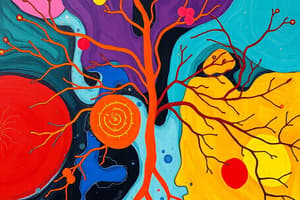Podcast
Questions and Answers
What is the main function of lymphatic capillaries in the lymphatic system?
What is the main function of lymphatic capillaries in the lymphatic system?
- Transport lymph from lymph nodes to lymphatic ducts
- Serve as the smallest components that collect excess fluid (lymph) (correct)
- Act as the primary organs that filter foreign substances from the lymph
- Help in the production of antibodies to fight infections
Which of the following is NOT a type of lymphatic vessel in the lymphatic system?
Which of the following is NOT a type of lymphatic vessel in the lymphatic system?
- Lymphatic collectors
- Lymphatic trunks
- Lymphatic capillaries
- Lymphatic nodes (correct)
What is the primary function of lymph nodes in the lymphatic system?
What is the primary function of lymph nodes in the lymphatic system?
- Transporting oxygen to different parts of the body
- Storing excess water in the body
- Filtering lymph and removing pathogens (correct)
- Producing red blood cells
Where are lymph nodes primarily located in the human body?
Where are lymph nodes primarily located in the human body?
Which component of the lymphatic system contains immune cells like T and B cells?
Which component of the lymphatic system contains immune cells like T and B cells?
Which component of the lymphatic system transports lymph from lymphatic capillaries to the lymph nodes?
Which component of the lymphatic system transports lymph from lymphatic capillaries to the lymph nodes?
What is the role of lymphatic ducts in the lymphatic system?
What is the role of lymphatic ducts in the lymphatic system?
What is a vital role of the lymphatic system in the body's immune defense?
What is a vital role of the lymphatic system in the body's immune defense?
In addition to filtering lymph, what other function do lymph nodes perform in our body?
In addition to filtering lymph, what other function do lymph nodes perform in our body?
Which aspect of our health is directly supported by the lymphatic system?
Which aspect of our health is directly supported by the lymphatic system?
Study Notes
The Lymphatic System: A Vital Network of Tissue and Organs
The lymphatic system is a complex and interconnected network of tissues and organs that play a crucial role in our body's immune defense and overall health. Spanning from our skin to our bones, this system is intricately intertwined with our circulatory system.
Components of the Lymphatic System
The lymphatic system consists of several tissues and organs, including:
-
Lymphatic capillaries: These are the smallest and most numerous components of the system. They are found throughout our body, just beneath the skin and lining our organs. Lymphatic capillaries collect excess fluid (lymph) and transport it to larger lymphatic vessels.
-
Lymphatic vessels: These are thin, tube-like structures that transport lymph from lymphatic capillaries to the lymph nodes and ultimately to the lymphatic ducts. Lymphatic vessels are made up of three primary types:
a. Lymphatic capillaries: As mentioned, these vessels are the smallest and most numerous components of the lymphatic system.
b. Lymphatic collectors: These are larger vessels that transport lymph from lymphatic capillaries to the lymph nodes and lymphatic trunks.
c. Lymphatic trunks: These are larger vessels that transport lymph from the lymph nodes to the lymphatic ducts.
-
Lymph nodes: These are small, bean-shaped organs that are strategically positioned throughout our body, primarily in our neck, armpits, and groin. Lymph nodes filter lymph, which helps them identify and destroy pathogens such as bacteria, viruses, and cancer cells.
-
Lymphatic ducts: These are the final component of the lymphatic system, with two primary ducts: the right lymphatic duct and the thoracic duct. Lymphatic ducts transport lymph from the lymphatic trunks to the bloodstream.
The Function of Lymph Nodes
Lymph nodes perform several essential functions, including:
- Filtering lymph: Lymph nodes act as filters to remove pathogens, cells, and particulate matter from the lymph.
- Producing and activating immune cells: Lymph nodes contain immune cells, such as T and B cells, which are crucial for fighting infections and producing antibodies to protect us from diseases.
- Storing immune cells: Lymph nodes store immune cells in anticipation of future infections.
The Role of the Lymphatic System in Our Health
The lymphatic system plays a vital role in maintaining our overall health:
- Supporting the immune system: The lymphatic system is an essential component of our immune defense, as it helps filter and remove pathogens and cancer cells from our body.
- Regulating fluid balance: Lymphatic vessels help regulate the fluid balance in our body by collecting excess fluids and returning them to the bloodstream.
- Absorbing fats and nutrients: Lymphatic vessels in the small intestine absorb fats and nutrients from the food we eat and transport them to the lymphatic ducts, which then deliver them to the bloodstream.
In summary, the lymphatic system is a complex and interconnected network of tissues and organs that play a crucial role in our body's immune defense and overall health. This system is composed of lymphatic capillaries, lymphatic vessels, lymph nodes, and lymphatic ducts. The lymphatic system helps filter and remove pathogens, support the immune system, regulate fluid balance, and absorb fats and nutrients from the food we eat.
Studying That Suits You
Use AI to generate personalized quizzes and flashcards to suit your learning preferences.
Description
Explore the intricacies of the lymphatic system, a vital network of tissues and organs that plays a crucial role in immune defense and overall health. Learn about its components such as lymphatic capillaries, vessels, nodes, and ducts, as well as its functions in filtering pathogens, producing immune cells, regulating fluid balance, and absorbing nutrients.





